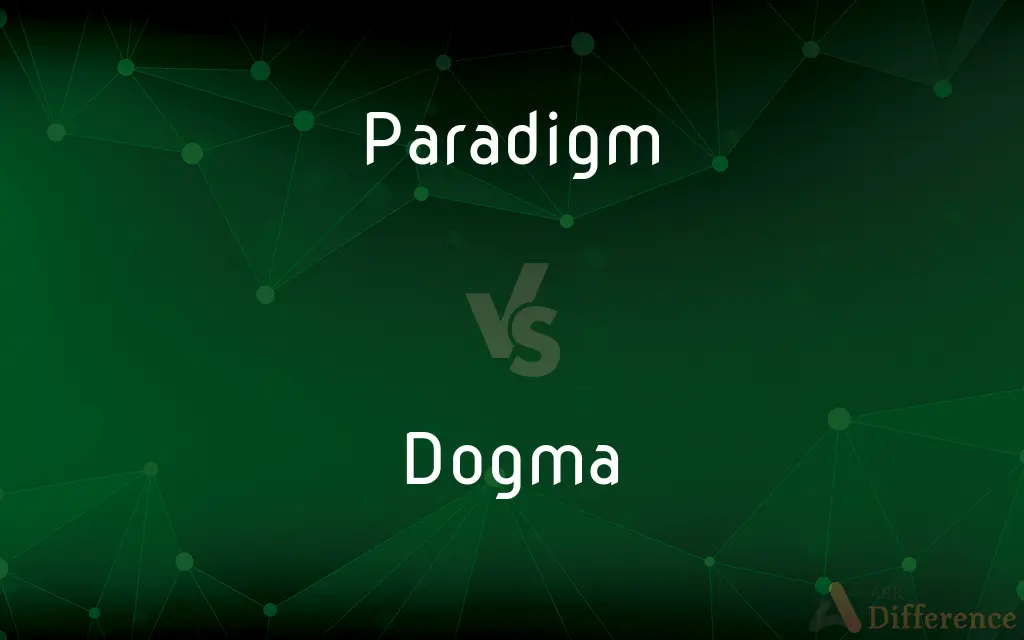Paradigm vs. Dogma — What's the Difference?
By Maham Liaqat & Urooj Arif — Updated on March 14, 2024
A paradigm is a framework of ideas guiding thought or practice, while dogma represents unquestioned beliefs, often in a religious context.

Difference Between Paradigm and Dogma
Table of Contents
ADVERTISEMENT
Key Differences
Paradigms and dogma, though both influential in shaping perspectives and behaviors, diverge in their flexibility and application. A paradigm serves as a conceptual or methodological model, guiding how ideas are structured and how questions are approached within a particular field of study or aspect of life. It offers a way to understand and engage with the world, based on a set of assumptions, concepts, values, and practices that are accepted by a community. In contrast, dogma refers to a set of principles or beliefs that are accepted without question, often within a religious, philosophical, or organizational context. Dogmas are typically more rigid, prescribing a specific set of beliefs that members of a community are expected to adhere to without deviation.
The origin and development of paradigms and dogmas also highlight their differences. Paradigms emerge from scientific, academic, or philosophical inquiries, evolving over time as new discoveries and insights challenge existing models. This evolution underscores the dynamic nature of paradigms, which are subject to change and refinement in light of new evidence or interpretations. Dogma, however, originates from authoritative declarations or teachings, often with the intent of preserving the core tenets of a faith, ideology, or organization. Once established, dogmas are less susceptible to change, serving as fixed points of belief that guide and bind a community.
While paradigms are often associated with progress and innovation, encouraging exploration and questioning within their frameworks, dogmas tend to enforce conformity and adherence to established beliefs. Paradigms provide a basis for exploring the unknown, offering tools and perspectives for investigation and understanding. They invite debate and revision, fostering an environment where ideas can be contested and refined. Dogma, on the other hand, discourages questioning of its tenets, promoting a more uniform acceptance of its teachings. This distinction highlights the different roles paradigms and dogmas play in facilitating growth and understanding versus preserving tradition and unity.
The application of paradigms and dogmas further illustrates their differences. In scientific research, education, and various forms of intellectual inquiry, paradigms offer frameworks that guide exploration, hypothesis formation, and the interpretation of findings. They are instrumental in shaping the questions researchers ask and the methods they use to seek answers. Dogmas, however, find their application primarily in religious, moral, and philosophical contexts, where they define the boundaries of belief and practice, shaping the identity and cohesion of communities around shared convictions.
The impact of paradigms and dogmas on individual and collective behavior underscores their significance. Paradigms influence how individuals approach problems and opportunities, encouraging a mindset of inquiry and adaptability. They shape how knowledge is acquired, interpreted, and applied across various domains of life. Dogmas, in contrast, play a crucial role in defining moral and ethical standards within communities, offering a sense of certainty and shared purpose. They guide behavior and decision-making based on a collective commitment to a set of inviolable beliefs.
ADVERTISEMENT
Comparison Chart
Definition
A conceptual framework guiding thought or practice
A set of unquestioned beliefs, often religious
Flexibility
Open to change and evolution
Generally rigid and unchanging
Origin
Emerges from scientific, academic, or philosophical inquiry
Established through authoritative declaration or teaching
Role
Encourages exploration and innovation
Enforces conformity and adherence
Application
Used in research, education, and intellectual inquiry
Applied in religious, moral, and philosophical contexts
Impact on Behavior
Fosters a mindset of inquiry and adaptability
Defines moral and ethical standards
Compare with Definitions
Paradigm
A set of accepted beliefs and practices in scientific or academic fields.
The theory of relativity created a new paradigm in physics.
Dogma
A principle or set of principles laid down by an authority as incontrovertibly true.
The dogmas of the faith are central to the church's teachings.
Paradigm
A framework that guides thinking and research.
The paradigm shift towards sustainability is reshaping industries.
Dogma
Firmly held beliefs by a particular group.
The scientist challenged the dogma that had dominated the field for decades.
Paradigm
A dominant way of looking at a particular subject.
The digital revolution has created a new paradigm in communication.
Dogma
Unquestioned beliefs that guide the behavior of a group.
The political party's dogma influenced its policies and decisions.
Paradigm
A model or pattern that influences approaches to problems.
Her research introduced a new paradigm for studying gene expression.
Dogma
A conviction held with strong authority and not subject to dispute.
The community adhered strictly to its ancestral dogmas.
Paradigm
An example serving as a model in any discipline.
His work on biodiversity is considered a paradigm of conservation biology.
Dogma
A doctrine or body of doctrines concerning faith or morals formally stated and authoritatively proclaimed.
Philosophical dogmas can shape societal norms and values.
Paradigm
In science and philosophy, a paradigm () is a distinct set of concepts or thought patterns, including theories, research methods, postulates, and standards for what constitutes legitimate contributions to a field.
Dogma
Dogma in the broad sense is any belief held with undefended certainty. It may be in the form of an official system of principles or doctrines of a religion, such as Roman Catholicism, Judaism, or Protestantism, or atheism, as well as the positions of a philosopher or of a philosophical school such as Stoicism.
Paradigm
A typical example or pattern of something; a pattern or model
Society's paradigm of the ‘ideal woman’
Dogma
A doctrine or a corpus of doctrines relating to matters such as morality and faith, set forth in an authoritative manner by a religion.
Paradigm
A set of linguistic items that form mutually exclusive choices in particular syntactic roles
English determiners form a paradigm: we can say ‘a book’ or ‘his book’ but not ‘a his book’
Dogma
A principle or statement of ideas, or a group of such principles or statements, especially when considered to be authoritative or accepted uncritically
"Much education consists in the instilling of unfounded dogmas in place of a spirit of inquiry" (Bertrand Russell).
Paradigm
(in the traditional grammar of Latin, Greek, and other inflected languages) a table of all the inflected forms of a particular verb, noun, or adjective, serving as a model for other words of the same conjugation or declension.
Dogma
An authoritative principle, belief or statement of opinion, especially one considered to be absolutely true and indisputable, regardless of evidence or without evidence to support it.
Paradigm
One that serves as a pattern or model.
Dogma
A doctrine (or set of doctrines) relating to matters such as morality and faith, set forth authoritatively by a religious organization or leader.
In the Catholic Church, new dogmas can only be declared by the pope after the extremely rare procedure ex cathedra to make them part of the official faith.
Paradigm
A set or list of all the inflectional forms of a word or of one of its grammatical categories
The paradigm of an irregular verb.
Dogma
That which is held as an opinion; a tenet; a doctrine.
The obscure and loose dogmas of early antiquity.
Paradigm
A set of assumptions, concepts, values, and practices that constitutes a way of viewing reality for the community that shares them, especially in an intellectual discipline.
Dogma
A formally stated and authoritatively settled doctrine; a definite, established, and authoritative tenet.
Paradigm
A pattern, a way of doing something, especially a pattern of thought, a system of beliefs, a conceptual framework.
Thomas Kuhn's landmark “The Structure of Scientific Revolutions” got people talking about paradigm shifts, to the point the word itself now suggests an incomplete or biased perspective.
Dogma
A doctrinal notion asserted without regard to evidence or truth; an arbitrary dictum.
Paradigm
An example serving as the model for such a pattern.
Dogma
A religious doctrine that is proclaimed as true without proof
Paradigm
(linguistics) A set of all forms which contain a common element, especially the set of all inflectional forms of a word or a particular grammatical category.
The paradigm of "to sing" is "sing, sang, sung". The verb "to ring" follows the same paradigm.
Dogma
A doctrine or code of beliefs accepted as authoritative;
He believed all the Marxist dogma
Paradigm
An example; a model; a pattern.
Paradigm
An example of a conjugation or declension, showing a word in all its different forms of inflection.
Paradigm
An illustration, as by a parable or fable.
Paradigm
A theory providing a unifying explanation for a set of phenomena in some field, which serves to suggest methods to test the theory and develop a fuller understanding of the topic, and which is considered useful until it is be replaced by a newer theory providing more accurate explanations or explanations for a wider range of phenomena.
Paradigm
Systematic arrangement of all the inflected forms of a word
Paradigm
A standard or typical example;
He is the prototype of good breeding
He provided America with an image of the good father
Paradigm
The class of all items that can be substituted into the same position (or slot) in a grammatical sentence (are in paradigmatic relation with one another)
Paradigm
The generally accepted perspective of a particular discipline at a given time;
He framed the problem within the psychoanalytic paradigm
Common Curiosities
Why are dogmas considered rigid?
Dogmas are considered rigid because they are established beliefs that members of a community are expected to adhere to without deviation, serving to preserve the core tenets of a faith or ideology.
What defines a dogma?
Dogma refers to a set of beliefs or principles that are accepted without question, often with a religious, philosophical, or organizational basis, and are upheld by authoritative declarations.
How do paradigms change?
Paradigms change through scientific or intellectual advancements that challenge existing models, leading to the development of new frameworks that better explain or interpret phenomena.
Can a paradigm shift influence society?
Yes, paradigm shifts can have profound societal impacts by changing how individuals understand the world, influencing technological, scientific, and cultural developments.
Can individuals have their own paradigms?
Yes, individuals can develop personal paradigms that guide their understanding and approach to life, influenced by their experiences, education, and cultural background.
What is a paradigm?
A paradigm is a conceptual or methodological framework that guides how ideas are structured and explored within a field of study or aspect of life.
Do all disciplines have paradigms?
Most disciplines, especially in science and academics, operate within paradigms that guide research and inquiry, though the specific frameworks vary widely across fields.
Is questioning dogma acceptable in most communities?
Questioning dogma is often discouraged in communities where dogmas serve as the foundation of shared beliefs and practices, as it can challenge the basis of communal identity and cohesion.
How does a paradigm differ from a theory?
A paradigm is a broader framework that guides thinking and research in a field, while a theory is a specific explanation of phenomena within that framework.
How do dogmas influence personal behavior?
Dogmas influence personal behavior by providing a set of unquestioned beliefs that guide decision-making, ethical choices, and daily practices within a community.
Share Your Discovery

Previous Comparison
Drink vs. Chug
Next Comparison
Control vs. SubmissionAuthor Spotlight
Written by
Maham LiaqatCo-written by
Urooj ArifUrooj is a skilled content writer at Ask Difference, known for her exceptional ability to simplify complex topics into engaging and informative content. With a passion for research and a flair for clear, concise writing, she consistently delivers articles that resonate with our diverse audience.














































